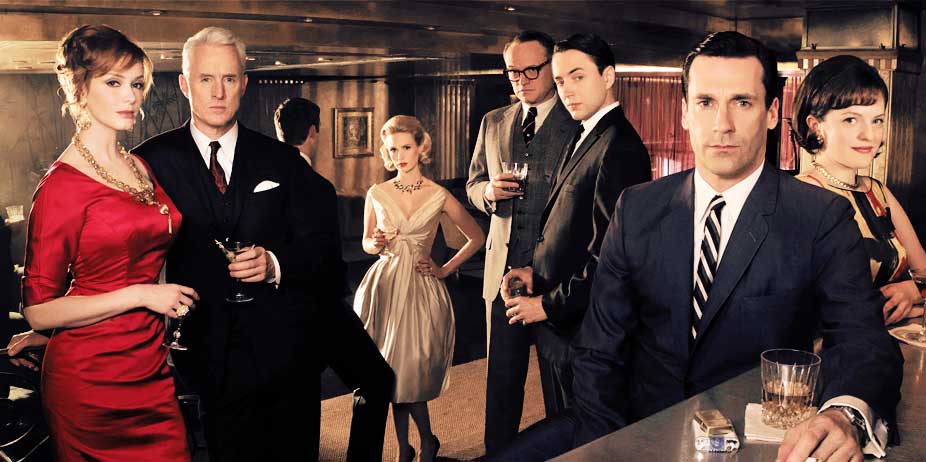
Mad Men, Season Four (2010)
Political correctness had not been invented yet, cigarettes were in, drinking at lunch was seen as brainstorming, and only a handful of people had color televisions. Welcome to the world of Mad Men.
Starting a new business is always a challenge and the process of beginning a new ad agency has the partners at Sterling Cooper Draper & Price seriously stressed. Their collective retirement from a previous agency after a buy-out has left them hungry to make a name for themselves and with dozens of talented copywriters and artists, but not much money in the bank. Their dreams of future success are damaged when Don Draper (John Hamm) has a disastrous newspaper interview in which he comes across as a pompous jerk. Known for his intelligent ad campaigns but also for his drinking, womanizing, and insulting clients, he is told to shape up his personality and make mends before it costs them one of their biggest potential clients. But Don has more than his job on his mind -- he also has an angry ex-wife (January Jones) still living in his house, while he stays at an apartment in town, even though her new husband is pressuring her to move. His daughter Sally (Kiernan Shipka) is acting out and may need therapy. And he cannot seem to find his romantic footing.
Meanwhile, his ire is enraged when Peggy (Elisabeth Moss) pulls a cheap publicity stunt to woo a client, which creates tension between them that filters into an office where emotions are already high. Pete Campbell (Vincent Kartheiser) is anticipating his first child, Joan (Christina Hendricks) is dreading the departure of her husband for Vietnam, and after making a glaring error of judgment, Don must make do with a new secretary -- and one who isn't about to put up with any of his nonsense. In terms of writing alone this season is considered by many to be the most solid. It certainly is an impressive achievement in the sense that the peril of the agency is an undercurrent throughout and when a crisis transpires, fills the last couple of episodes with an increasing sense of dread as people are laid off and the firm struggles to survive. In spite of disapproving of the mass immorality that goes on in the office, it's hard not to become invested in these characters' lives -- even if it means hating them. Morally speaking there is no one to root for, since at some point everyone winds up in bed with someone else -- or in certain instances, back in bed with previous lovers... in spite of now being married.
The detail in the series is incredible, with rich costumes and set design, right down to authentic beer can labels and dolls from the era. The acting is also superb and understated, so much so that many of the cast members have become recognizable for this show alone. Hamm has to carry the narrative on Don Draper's shoulders -- a challenge considering he's not a man you can admire. I don't even like the character but I do care what happens to him. When his past nearly catching up to him causes him to have a panic attack, my own heart beat faster. In terms of content, there is a moderate amount of it but the biggest issue here is adultery and fornication. Sometimes it becomes explicit and at others it relies on implications... Don beds multiple women in the course of the series, some of them once and others with greater frequency. He is shown kissing and/or cuddling with them before and after; one encounter is explicit, with movement; we hear another woman moaning in a later scene; it's implied a date performs oral sex on him in a cab. Joan and Roger have a sexual encounter after being mugged -- neither one are sorry about it. An artist who has it in for Joan draws a crude cartoon of her "servicing" one of the partners.
Peggy is annoyed by a male coworker's constant remarks about not being sexually interested in her, to the extent of removing her clothes while working together in a hotel room (she does it to make him uncomfortable); he also removes his clothes, but the camera avoids any nudity. She does, however, make some references to how aroused he is. She resists sleeping with her boyfriend for awhile until someone tells her not to do it unless she doesn't want to marry him -- the next scene shows them in bed, indicating she has no martial ambitions. She spends the night with a couple different men in subsequent episodes. Though it is not shown, it is inferred that an adult discovers a young girl pleasuring herself; there is some conversation about masturbation as a result. Peggy becomes friends with a practicing lesbian. Jesus' name is abused a couple dozen times, there is one f-word, and repeated uses of s**t. Other profanities occasionally intrude. References are made to drug addiction. Drinking is frequent and usually results in drunkenness (Don being an alcoholic makes up much of the plot); there is a lot of smoking and some inferences of racism. A woman considers having an abortion and we believe she has gone through with it.
In worldly terms this is a great show with terrific characters and a unique setting, but from a religious perspective it is a total train wreck -- about people who seem to intentionally destroy their lives through repeated poor choices and selfishness. It's impossible to root for Don to find a good woman because we just know that five minutes after the wedding he is probably going to cheat on her. Even characters that formerly had morals have now abandoned them. It's an interesting look into advertising but in the end it merely serves as a bitter reminder of how awful lives can be without any moral direction or guidance.
